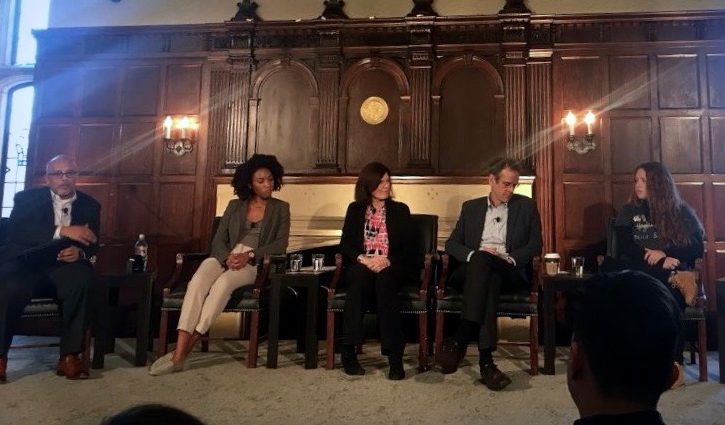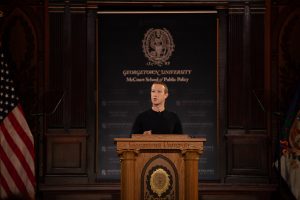Panelists looked at the causes of success in social and political movements during a discussion at Georgetown on March 23. Convened by University President John DeGioia, the panel, “What Makes Movements Successful? How Students Can Change Policy,” addressed the question by saying the success of a movement depends on organizing locally before nationally, and the importance of placing students at the center of the movement.
Approximately 60 people, ranging from undergraduate students to senior citizens, came to Copley Formal Lounge to hear the panelists discuss what they have found are the key factors in an effective movement based on their experiences and research.
The panel featured five speakers: Leslie Crutchfield, executive director of Georgetown’s Global Social Enterprise Initiative; David Cole, national legal director at the ACLU; Leticia Bode, an associate professor of communication, culture, and technology; Sarah Clements (COL ’18); and Colleen Roberts (COL’15), the associate director for alumni of color. Mo Elleithee (F’94), executive director of the Georgetown Institute of Politics and Public Service, moderated the discussion.
They spoke on the role of courts in the success of a political movement, the impact of social media on campaigns, who does and who should lead movements, and what makes this movement surrounding gun violence different.
“I think it’s an important conversation and an important moment,” said Elleithee, referring to the current activism surrounding gun violence. “Regardless of the political spectrum, regardless of what issues motivate you to activism, students really are the catalyst for activism.”
Many of the panelists agreed that the success of a movement depends on the level at which outreach is primarily focused.
“The most important factor that differentiates the winning movements from the rest is this: it’s their grassroots,” said Crutchfield. “The movements that tried to just focus at the federal or national level from the outset have by and large, kind of sputtered.”
She argued that the most successful movements had to be strategic in order to change the worldview on a subject before being able to make policy changes.
“In every successful movement, whether it’s on the right or the left, if the people who have lived the experience of the problem, if they’re out front, you win,” said Crutchfield.
When discussing the legal side of activism, Cole used the movement for LGBT marriage rights as an example of a successful movement that initially lost in the courts.
“A whole host of gay and lesbian rights organizations were created and they engaged in a long, incremental process of changing hearts and minds,” said Cole.
He said that when the courts did deliberate about the issue again, even though the arguments hadn’t changed, the world had because of the efforts of activists.
The panel’s expert on the impact of social media was Leticia Bode, who said that technology has increased political involvement and made mobilization of individuals easy.
“Technology has changed the speed at which [the results of boycotting] happens, and the expectations of the corporations for other responses,” said Bode.
When the Parkland students started calling out corporations on social media platforms that received investment from the NRA, or allowed weapons on their premises, many of those companies made immediate responses to change their policies.
“Getting companies to change their policies and approach actually does influence policy change,” said Crutchfield.
Clements, an activist whose mother survived the Sandy Hook shooting in 2012, was the student panelist at the event. When discussing the March for Our Lives, she said that what distinguishes this gun control moment from others is that it is student-led.
Clements said that she has met many victims of gun violence in minority communities who have been fighting for years to be heard with little avail.
“We will not end gun violence in the United States if we don’t listen to the communities that have been facing this the longest and have been organizing this the longest,” Clements said.
Roberts discussed minority representation in activism and the privilege of protesting. She gave the example of when VonDerrit Meyers, was shot and killed in St. Louis a week before the Ferguson uprisings in 2014, a group of students from Saint Louis University mobilized.
“There was a national convening, but there wasn’t a national attention on that moment,” said Roberts.
She compared the Ferguson protests to the attention the Parkland students have today and said that there is always a power dynamic that makes it harder for minorities to bring a movement to success, if not impossible.
The panelists also emphasized the impact that students have when they take a central role in activism.
Hamza Atumah (COL ‘20) said he was motivated to attend the discussion because of his desire to take an active role in social and political movements.
“I feel as though [the panel] had the potential to provide me an opportunity to evoke political action on campus right now, in a way that was meaningful to me,” said Atumah. “And I think it did do that in a lot of ways.”
Bode noted that students’ desire to get involved, like Atumah said he was, is crucial to having a movement reach its goals.
“Successful movements have included students, and that’s not an accident,” said Bode. “Students have a particular type of privilege that means you have resources available to you, time available to you, and you have something that excites you…— use it.”






